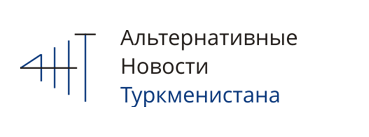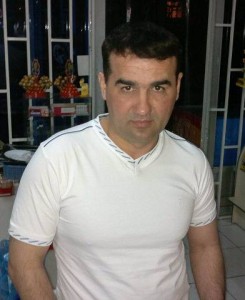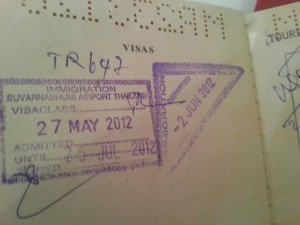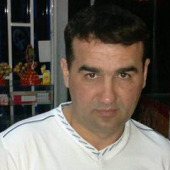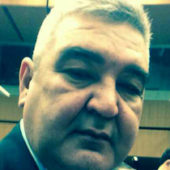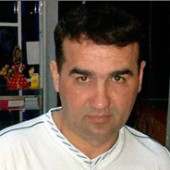20 November 2014 – Turkmen citizen Mansur Mingelov continues to serve his 22-year prison sentence for complaining to the President of Turkmenistan, U.S. diplomats in Ashgabat and the local office of the Organisation for Security and Cooperation in Europe (OSCE) about torture and beatings he and other 11 people had endured while in custody of Turkmen Drug Police.
During the 19-day hunger strike in protest against his illegal sentence on false allegations, the Turkmen security services, among other things, tried to make a deal with Mingelov to change his heavy charges to lighter ones in exchange for ending the hunger strike. While all these proposals were rejected, Mingelov ended the hunger strike when the Head of Department of Corrections, Chary Geldyev, had personally promised Mingelov to reconsider his case.
However, two prisoner amnesties have been proclaimed in Turkmenistan since this time – in July and October – Mingelov continues to serve his sentence. Moreover, Mingelov’s family members are facing unprecedented pressure from the Turkmen security services. Alternative Turkmenistan News (ATN) publishes the entire chronicle of events connected to the fate of Mansur Mingelov.
Chronicle of Events
According to ATN sources, approximately 2,000 prisoners were freed in honor of the 23rd anniversary of Turkmenistan’s independence celebrated on 27-28 October 2014. Amnesty mainly affected those convicted of rape (all three parts of article 134, in cases with fewer than four years remaining of their sentence), robbery (article 231, parts 1, 2 and 3), theft, fraud, misappropriation of funds or embezzlement (articles 227, 228 and 229, if repaid), sodomy (article 135), and evasion of military service (article 19, part 1).
Unfortunately no such pardon was given to Mansur Mingelov, an ethnic Baloch who was sentenced in 2012 to 22 years in prison after being falsely convicted of contraband, possession of narcotics, production of pornography, and involving minors in “antisocial activities.”
Mingelov was first arrested in connection with a criminal case involving his brother on 6 June 2012, one day after his brother was arrested. Mingelov was forcibly placed in a regional drug rehabilitation center and kept there for 15 days. His placement there was not connected to drug addiction – Mingelov had never used narcotics – but rather to allow the traces of a beating inflicted on 6 June to heal. During these 15 days there were two attempts to surreptitiously plant narcotics on Mingelov and one attempt to deceitfully get him to sign a blank piece of paper.
On 22 June 2012, Mingelov was released when no crime was found to have been committed. Once free, Mingelov filed a complaint with the Prosecutor General’s Office of the President of Turkmenistan about the beatings and torture inflicted by employees of the State Service for Security Protection of a Healthy Society (formerly the State Drug Control Service). Between 22 June and 2 August, up to the time of his next arrest, Mingelov collected evidence and then documented 11 cases of torture and ill-treatment affecting other members of Baloch community in Mary province. Having copied his information onto CDs, he sent them to the U.S. Embassy in Ashgabat, the OSCE, and the Prosecutor General’s Office.
Reports from various people included allegations of law enforcement officers using chisels on detainees’ bones, pulling the scrotum with pliers, electric shock, and the use of chair legs and plastic bottles for beatings.
Mingelov’s disclosure about the crimes of Turkmenistan’s narcotics police served as the reason for Mingelov’s repeat arrest. Over the course of five days, a criminal case was fabricated. Despite many unresolved contradictions and discrepancies, the court found Mingelov guilty and sentenced him to 22 years in prison. Other defendants and witnesses in the case denied Mingelov’s guilt on all charges, but the court came to its conclusion based on some preliminary witness testimony that was absent from the trial.
Mansur Mingelov’s fate became known to the wider public in April 2014 when Amnesty International came to the defense of the Turkmen prisoner and called upon the world community to prevent his illegal return to Ovadan-Depe prison, where he had previously been regularly beaten.
While his transfer to Ovadan-Depe prison was successfully stopped, pressure on Mingelov was turned up by the prison warden Maj. Batyr Gullyev, who promised to deprive him of visits and to limit his packages. Pressure was also put on Mingelov’s family, his close and distant relations, and even on his neighbors. On 19 May 2014 at LB/K-11 labor camp in Seydi, Lebap Province, Mingelov announced an indefinite hunger strike in protest against his sentence and against the psychological pressure being used against him. Mingelov maintained his innocence and demanded a meeting with the prosecutor and a review of his case and his sentence. The hunger strike lasted 19 days. During this time, a prosecutor, a psychologist, and security services visited Mingelov. Some threatened him, others tried to dissuade him from continuing, still others tried to negotiate with him and to change his sentence to a lighter one and to free him in the near future.
The hunger strike ended on 8 June after a visit to Mingelov (now near death) by the head of the Department of Corrections, Chary Geldyev. The official promised to review Mingelov’s case in exchange for the mass media ending its publication of information about Mingelov.
After learning that Mingelov was alive and had ended his hunger strike, there has been no more news about him. While two acts of amnesty have taken place in Turkmenistan since this time – in July and October – Mingelov continues to serve his sentence. The official did not keep his promise. Today Alternative Turkmenistan News publishes the entire chronicle of events connected to the fate of Mansur Mingelov.
3-5 June, 2014
Mingelov’s relatives met with a representative of the U.S. Embassy in Turkmenistan, Ms. Shan Shi, deputy secretary of the political-economy section. The meeting was initiated by Mingelov’s family and took place at the diplomatic mission. The goal of the meeting was to find out if any effort was being made by American diplomats in regard to Mingelov’s case. Ms. Shi informed them that the U.S. Embassy had not made any inquiries into the case. The U.S. diplomat noted that in order to send such a request, the American side should be certain of the innocence of Mingelov and this would require documented proof. At the end of the meeting, Ms. Shi took a copy of Mingelov’s sentence and asked his relatives to translate the 23-page document into English.
6 June 2014
Mansur Mingelov is near death. His legs have given out. Doctors at the infirmary reported this to the prison administration and they began to visit Mingelov every 2-3 hours. Prison warden Maj. Gullyev asks Mingelov to end the hunger strike.
7 June 2014 – the day before the end of the hunger strike
A prosecutor and a psychologist arrived at the prison and tried to persuade Mingelov that both he and they had reached a critical juncture. Mingelov did not back down from his demands.
8 June 2014
At 2:00 am two people arrived at the prison. The first was the head of the Department of Corrections, Chary Geldyev. The second was only introduced as «supervisor» but his questions and rough manner showed him to be a representative of the Ministry of National Security. The visitors were interested in Mingelov’s connections with the mass media and international organizations. The conversation between the two of them yielded nothing – they were rude to each other and the «supervisor» left. The conversation with Mr. Geldyev continued until 5 o’clock in the morning. At first the official urged Mansur to accept a change to a lighter sentence («you will be freed during the upcoming amnesty»), but after Mingelov refused, Geldyev agreed to review the case – with the proviso that he was not responsible for the results of the review. Mingelov answered that if the investigation was conducted properly, then he would be satisfied with the result. Geldyev agreed but requested that information about Mingelov not be put on the Internet in the future. The hunger strike ended.
9 June 2014
Officials from the State Service for Security Protection of a Healthy Society (formerly the State Drug Control Service) arrived at Mingelov’s home and brought in his wife and young child for interrogation. The questioning took place at the city police department and lasted about 20 minutes. Officials of the department questioned the young woman about the Mingelov’s family property, the house they live in, how and when he inherited it. Besides this, the drug enforcement police wanted to know how and when the woman became acquainted with Mansur, why his mother travels to Ashgabat so often, etc.
July 2014
During the first half of July (the exact date is not known), before the amnesty decree for prisoners in honor of the Night of Destiny, officials from the Ministry of National Security repeatedly asked Mingelov’s family to write a request for amnesty to the President. They also proposed that Mansur sign a prepared article in which he would thank the President for mercy and justice, and that for his freedom he would be grateful specifically to the head of state, and not to “international organizations being sponsored by hostile countries.” The article was intended for mass distribution by the media of Turkmenistan. Mansur Mingelov rejected all of these proposals.
June – July 2014
Security Services continue to put unprecedented pressure on members of Mingelov’s family. His wife was again called in, but this time to the passport office, supposedly to confirm her registration. In reality two men again interrogated the woman: How often did she visit Mansur in prison? Who among their friends and relatives was especially close to him? And so on. The Security Services officials also called on Mingelov’s neighbors to find out who associated with his wife. Distant relatives of Mansur’s wife received similar visits.
October 2014
Officials from the Department of Corrections and prosecutors again interrogated Samandar Mirdostov, who is serving his 13-year sentence at LB-K/12 labor camp in the town of Seydi. During the court examination, Mirdostov retracted his earlier testimony in which he alleged that Mansur Mingelov had been involved in their narcotics-related deeds. The details of the latest interrogation of Mirdostov are not known.
Proof of Mansur Mingelov’s Innocence
Mansur Mingelov was convicted on four counts under the criminal code of Turkmenistan: involving minors in antisocial activities (article 156), distribution of pornography (article 164), contraband (article 254), and illegal acquisition, storage and transport of narcotics with intent to sell (article 292).
Proof of his innocence on the last two counts is found in Mingelov’s passport, which has border control stamps from Ashgabat airport, as well as Suvarnabhumi Airport in Bangkok, Thailand. The date of entry on both stamps is 27 May 2012 and the date of exit is 2 June. Mingelov’s verdict states that the contraband of narcotics (more than 13 and a half kilograms of opium) from neighboring Iran by a group of people with prior agreement and with intent to sell, took place on 29 May 2012 in Mary Province on the Mary-Ashgabat route. So the ‘crime’ took place while Mingelov was thousands of kilometers away from Turkmenistan.
Besides this, all of the witnesses and participants in this matter stated in court that Mingelov had no knowledge of whom the narcotics were being supplied to or at what price they were sold. One of the participants in this matter, Samandar Mirdostov, retracted his earlier testimony alleging that Mingelov was in on it (see all pages of the court case here: https://habartm.org/archives/1704).
On the charge of involving minors in antisocial activities, it is clear from the verdict that all of the girls involved denied any kind of coercion on the part of Mingelov: he did not offer them liquor and they drank the beer willingly (see page 11 of the verdict). The verdict included the testimony of the “victims,” whom, the investigation alleged, Mansur and his brother Rustam involved in “antisocial activities.” These allegations were taken down by investigators as if they were the actual words of the “victims.” In reality however this testimony did not correspond with what the girls said in court. Investigators took advantage of the fact that all four “victims” were Russian and did not speak a word of Turkmen, but under pressure from the prosecutor’s staff, signed their names to testimony, the contents that had not been translated for them. There is also some evidence that the girls were bullied and threatened.
In court, Mansur Mingelov called the charge of distribution of pornography a slander, and stated that in his presence the investigators intentionally downloaded 93 pornographic videos. While the computer is known to have belonged to Mansur, it had recently been at the home of his brother, Rustam.
A. Saparbaev, an engineer with the state enterprise “TurkmenTelecom,” was called in as an expert to verify how and when the pornographic materials were downloaded on Mansur’s computer. He conducted an experiment on the subject of computer skills with Rustam Mingelov, who demonstrated his weak mastery of technology. Rustam could not even find the website “spaces.ru” from which the pornographic materials were allegedly downloaded. Rustam could not show how to download a video and save it on a computer when asked. All of this allegedly supports the fact that the pornographic materials were downloaded and uploaded not by Rustam, but rather by someone else, namely Mansur.
A similar experiment was not conducted with Mansur. We note here that the investigative actions concerning the distribution of pornography were conducted, for some reason, by drug enforcement investigators, rather than by Internal Affairs, as required by the country’s Code of Criminal Procedure (article 224 item 4, Code of Criminal Procedure of Turkmenistan).
To summarize the above, we draw the attention of the international community to the judicial arbitrariness found in the case of Mansur Mingelov, a citizen of Turkmenistan. And this arbitrariness continues to this day. Is a court honest, just and independent if it finds a man guilty of such crimes and, sentences him to more than two decades, and then tries to make a deal for his freedom in exchange for silence?
We call upon international human rights organizations, the governments of democratic nations, the EU, the OSCE, and other institutions to secure from the powers of Turkmenistan a review of the criminal case of Mansur Mingelov and the release of an innocent man! Security agencies in Turkmenistan must immediately end the pressure on members of Mansur Mingelov’s family!
On 29 October 2014 we met with senior Dutch diplomats at the Ministry of Foreign Affairs of the Netherlands in the Hague. The diplomats were informed of the developments in the case of Mansur Mingelov. They also received copies of previous notices from Amnesty International concerning Mingelov’s case. On 3 November Amnesty International again called upon the international community to influence Turkmenistan to review Mingelov’s case in accordance with international standards of a fair court.
***
P.S. In all of this time, the Turkmen side has not presented any other proof of Mansur Mingelov’s guilt, other than a couple of anonymous messages received by Alternative Turkmenistan News from “acquaintances” and “countrymen” of Mansur Mingelov, which describe him as a “bandit” and a “thug.”
For more information on the case of Mansur Mingelov please do not hesitate to contact us via the contact form.
